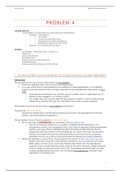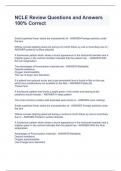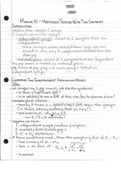Use of Force Public International Law
PROBLEM 4
Learning objective:
1. To what extent can states react to violent attacks on their territory?
o Exception 1: Self-defense
§ UN Charter
§ Customary International Law
§ Requirements for lawful self-defense
§ Self-defense against non-state actors
o Exception 2: Authorization by the UNSC
Literature:
- Jan Klabbers, ‘International Law’, Chapter 10
- E-lesson 14
- Corfu Channel-case
- Nicaragua-case
- Advisory Opinion Nuclear Weapons
- Oil Platforms-case
- Advisory Opinion Namibia (South West Africa)
1 TO WHAT EXTENT CAN STATES REACT TO VIOLENT ATTACKS ON THEIR TERRITORY?
Introduction
The doctrine on the use of force is also known as jus ad bellum
9 These rules regulate when force may be used legitimately.
9 In a case where force is used (irrespective of whether it is done legitimately), a succeeding
regime of law will enter into force, namely: international humanitarian law, also known as jus in
bello.
o International humanitarian law contains rules on warfare, that is: it prescribes how to
behave when engaged in an armed conflict.
o Jus in bello does not concern itself with the question whether a war has been lawfully
started (thus, whether the rules of jus ad bellum have been correctly applied).
This problem concerns only the rules on jus ad bellum (use of force)
Purposes UN: art. 1 UN Charter
- Include the maintenance of international peace and security, the development of friendly
relations, and international cooperation.
The prohibition of use of force is stated in art. 2(4) UN Charter
9 But it is also part of customary law, as confirmed in the Nicaragua-case
o The US had famously insisted on a so-called ‘multilateral treaty reservation’ in its
acceptance of the Court’s jurisdiction; the Court could, in disputes involving multilateral
treaties, only apply these multilateral treaties if all parties possibly affected by the
judgement were also parties to the proceedings. As a result, the Court was forced to
decide on the basis of customary international law and found that the customary
prohibition on the use of force continued to exist alongside the Charter prohibition.
9 The broad definition of ‘use of force’ found support from the ICJ in the Corfu Channel-case.
o Mines in the Corfu Channel, under Albanian jurisdiction, had cost the lives of several
British sailors, and the Court would hold Albania responsible even though Albania
claimed it had not itself laid those mines. More to the point, however, a British response
action in order to sweep for mines in the Corfu Channel several weeks later was also
roundly condemned by the Court. The UK offered two justifications, and both were
rejected by a unanimous ICJ.
1
PROBLEM 4
Learning objective:
1. To what extent can states react to violent attacks on their territory?
o Exception 1: Self-defense
§ UN Charter
§ Customary International Law
§ Requirements for lawful self-defense
§ Self-defense against non-state actors
o Exception 2: Authorization by the UNSC
Literature:
- Jan Klabbers, ‘International Law’, Chapter 10
- E-lesson 14
- Corfu Channel-case
- Nicaragua-case
- Advisory Opinion Nuclear Weapons
- Oil Platforms-case
- Advisory Opinion Namibia (South West Africa)
1 TO WHAT EXTENT CAN STATES REACT TO VIOLENT ATTACKS ON THEIR TERRITORY?
Introduction
The doctrine on the use of force is also known as jus ad bellum
9 These rules regulate when force may be used legitimately.
9 In a case where force is used (irrespective of whether it is done legitimately), a succeeding
regime of law will enter into force, namely: international humanitarian law, also known as jus in
bello.
o International humanitarian law contains rules on warfare, that is: it prescribes how to
behave when engaged in an armed conflict.
o Jus in bello does not concern itself with the question whether a war has been lawfully
started (thus, whether the rules of jus ad bellum have been correctly applied).
This problem concerns only the rules on jus ad bellum (use of force)
Purposes UN: art. 1 UN Charter
- Include the maintenance of international peace and security, the development of friendly
relations, and international cooperation.
The prohibition of use of force is stated in art. 2(4) UN Charter
9 But it is also part of customary law, as confirmed in the Nicaragua-case
o The US had famously insisted on a so-called ‘multilateral treaty reservation’ in its
acceptance of the Court’s jurisdiction; the Court could, in disputes involving multilateral
treaties, only apply these multilateral treaties if all parties possibly affected by the
judgement were also parties to the proceedings. As a result, the Court was forced to
decide on the basis of customary international law and found that the customary
prohibition on the use of force continued to exist alongside the Charter prohibition.
9 The broad definition of ‘use of force’ found support from the ICJ in the Corfu Channel-case.
o Mines in the Corfu Channel, under Albanian jurisdiction, had cost the lives of several
British sailors, and the Court would hold Albania responsible even though Albania
claimed it had not itself laid those mines. More to the point, however, a British response
action in order to sweep for mines in the Corfu Channel several weeks later was also
roundly condemned by the Court. The UK offered two justifications, and both were
rejected by a unanimous ICJ.
1







